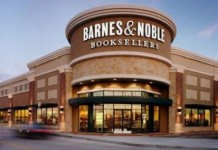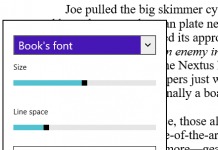 I stumbled onto one of those beautifully-quirky-but-ultimately-meaningless general interest articles on one of the many AOL Patch sites last night. This one comes from the dark and mysterious realms of the Malvern Public Library, which is located in a relatively affluent Philadelphia suburb. At this particular library—and at every other branch of its the Chester County Library System—a total of seven Nook e-readers were made available this past January for circulation among library patrons.
I stumbled onto one of those beautifully-quirky-but-ultimately-meaningless general interest articles on one of the many AOL Patch sites last night. This one comes from the dark and mysterious realms of the Malvern Public Library, which is located in a relatively affluent Philadelphia suburb. At this particular library—and at every other branch of its the Chester County Library System—a total of seven Nook e-readers were made available this past January for circulation among library patrons.
According to the story, “Each Nook is specific to one genre—mystery, romance, science, fiction, thrillers, fiction, nonfiction, biography—and comes pre-loaded with numerous titles.”
According to an MPL librarian by the name of Rosalie Dietz, the Nooks are so popular that all but one of the seven genre-specific devices are usually checked out at all times. As for the one Nook that’s often left on the shelf, unread and unloved? “The least popular is science fiction,” says librarian Dietz. “We usually have that hanging around here.”
* * *
The article’s author points to the unpopularity of the library’s sci-fi Nook a an odd anomaly. After all, he seems to be suggesting, the Nook is a high-tech gadget. Does it not follow that Nook users would be interested in high-tech lit?
Personally, I’m inclined to make the exact opposite argument: Reading on electronic devices has clearly reached some sort of a cultural tipping point, and neither tablets nor e-readers seem to be viewed as particularly high-tech by the average reader these days. Which is also why I wasn’t surprised to learn which of the Malvern Public Library’s Nooks are far and away the most popular among borrowers.The answer: Fiction, mystery and biography. It doesn’t get much more mainstream than that, am I right?

































Ah, perhaps the sci fi readers already have ereaders.
I like the idea of this, but I don’t understand why they would restrict them to genres.
Restricting books to genres makes ereaders much easier to load with appropriate content, and it doesn’t require a librarian’s valuable time that hand loading would if the patron could pick the titles she wants to read.
I’ve been around epublishing since the late Nineties. The very first major adapters of paid content were romance writers and readers, and they remain to be very strong in both senses.
Science fiction readers were the biggest adapters of illegal free content so, not surprisingly, sf writers and publishers were the most hostile to this new market and the slowest to adapt to it.
If the science fiction reader is just science fiction not the much more popular fantasy, it’s not that surprising that it’s the least popular reader. SF readers tend to be more tech friendly, and sf has a much smaller number of readers than the other popular genres. Both would cut down the number of people interested in the sf ereader in comparison to the others.